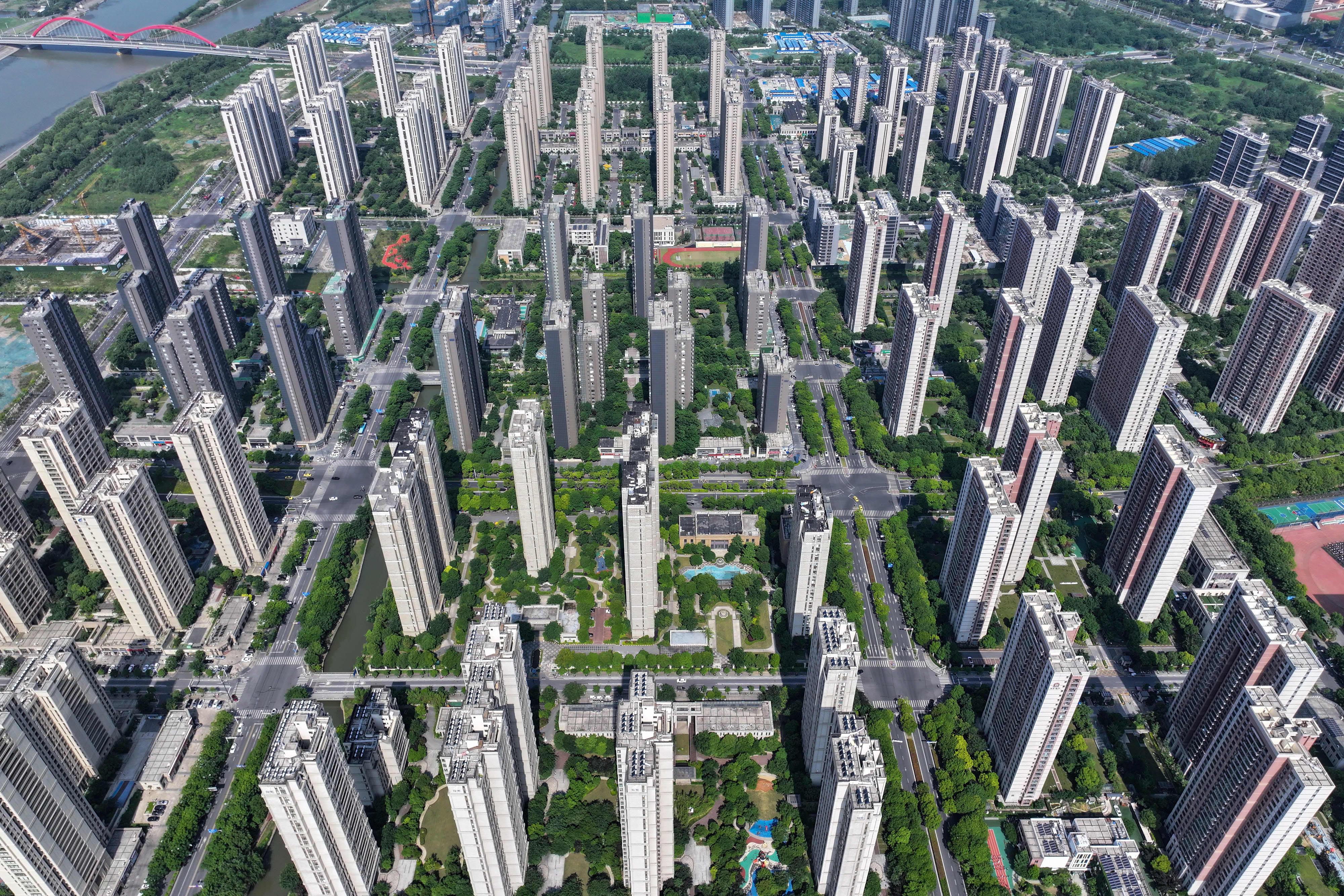These and other measures announced Friday marked Beijing's latest efforts to address issues in the massive real estate sector.
The People's Bank of China will provide 300 billion yuan ($42.25 billion) to financial institutions to lend to local state-owned enterprises (SOEs) so they can buy unsold apartments that have already been built.
Also Friday, the PBOC removed a floor on mortgage interest rates, and lowered the minimum down payment ratio for first- and second-time home buyers.
BEIJING — Chinese authorities on Friday pledged new support for state-owned enterprises to enable them to buy unsold apartments, in an effort that could help developers get more funding to finish construction on pre-sold properties.
These and other measures announced Friday marked Beijing's latest efforts to address issues in the massive real estate sector.
"I think it is encouraging that the policy is taking a turn of direction trying to support the housing market," said Zhu Ning, a professor of finance at Tsinghua University and author of the book "China's Guaranteed Bubble."
People's Bank of China Deputy Governor Tao Ling told reporters at a briefing Friday the central bank would provide 300 billion yuan ($42.25 billion) to financial institutions to lend to local state-owned enterprises (SOEs) so they can buy unsold apartments that have already been built.
The central bank expects the support to release 500 billion yuan in financing for such purchases, which the SOEs could turn into affordable housing.
The real estate companies can then use funds earned from those sales to complete construction on other apartments, the central bank said.
As for unfinished, pre-sold properties, the National Financial Regulatory Administration Deputy Director Xiao Yuanqi told reporters that commercial banks have provided 935 billion yuan in loans to finish construction on whitelisted projects since the program was released in January.
"The government's purchase of housing inventory can inject more liquidity to developers, who could then have more resources for housing delivery," Larry Hu, chief economist at Macquarie, told CNBC. "Finally the government stepped in as the buyer of the last resort."
"At this stage, it's mainly SOEs and local governments to implement the policies, but their resources may be too limited to move the needle at the macro level," he said. "Later on, we might see more efforts from the central government."
Developers "that must go bankrupt should go bankrupt, while those that need to be restructured should be restructured," Dong Jianguo, deputy head of the ministry of Housing and Urban-Rural Development, told reporters in Mandarin, translated by CNBC. He said homebuyers' interests and rights should be prioritized, and those that violate the law should be punished.
Wow a government spending billions to provide affordable housing instead of bombing civilians

It is incredible to think that so many western countries could just chop their military spending in half and spend the spare on affordable housing.
Yeah or like a dozen other productive and helpful things for the people they are supposed to govern
Meanwhile in
 :
Biden pledges $69420 trillion weapons package to Israel
:
Biden pledges $69420 trillion weapons package to IsraelBecause liberals won't realise that this is the difference between China and America unless communists spell it out for them, and the US is committing a real genocide.
Because China spends billions to put people into homes, America spends billions destroying homes and killing people you stupid fuck
Highlighting differences in the way that two completely different forms of structuring society and noting how one leads to better outcomes for people might make a poignant suggestion towards USians about what we could have if we didn't lick the boot of corporations
This action of the PBOC bailing out the failing real estate sector is really no different from the US bailing out the banks during the sub-prime mortgage crisis in 2008. The internal mechanism is slightly different because as you say, the society is structured differently, but the outcome is the same - a wealth transfer from the state to property owners.
Privatize the gains and socialize the losses.
The People's Bank of China will provide 300 billion yuan ($42.25 billion) to financial institutions to lend to local state-owned enterprises (SOEs) so they can buy unsold apartments that have already been built.
This reads, to me, as China loaning money to state owned "businesses" (think the United States Postal Service in the USA) to buy up real estate that sits too long. It will keep a USA 2008 style crash from happening while moving more housing from private hands into public hands.
What happened in the USA in 2008 was that private enterprises got free money with no strings attached to cover their losses. And that was it. Federal/state governments could have forced banks to renegotiate mortgages with the people living in the houses, or used the free money to buy controlling shares of businesses, or required that all these businesses that got free money could either pay the loan back on a schedule or the owners would take what money they could and the businesses would belong to the state/federal government to run.
What happened in the USA in 2008 was that private enterprises got free money with no strings attached to cover their losses. And that was it.
This is actually not true:
To address the crisis, Congress passed the Emergency Economic Stabilization Act of 2008. The act created the Troubled Asset Relief Program (TARP), which authorized the U.S. Department of the Treasury to buy up to $700 billion in toxic assets from companies, which could then replenish their balance sheets with safer assets.
The Treasury Department was also authorized to buy up to $250 billion in bank shares, which would provide much-needed capital to financial institutions. It bought $20 billion in shares each from Bank of America (BAC) and Citigroup (C). The Treasury Department later sold those shares back for a profit. In total, the government provided $245.1 billion in TARP assistance to banks and recouped $275.6 billion, for an investment gain of $30.5 billion.
As of September 30, 2023, all TARP programs have closed. While Congress authorized $700 billion for TARP, Treasury utilized far less than that. The TARP actual lifetime cost was approximately $31.1 billion, most of which was attributable to the program's efforts to help struggling homeowners avoid foreclosure.
- The cost of the financial crisis was properly measured by its human impact: the jobs lost, the wealth destroyed, and the hardship that fell upon millions of American families. From the very beginning, the primary purpose of the government’s response was to arrest the economy’s free fall and limit the recession’s devastation–not to make money.
- TARP helped prevent a second Great Depression, stabilized a collapsing financial system, and restarted the markets that provide mortgage, auto, student, and business loans.
- TARP's investment programs are closed. As of September 30, 2023, the total amount disbursed for TARP programs was $443.5 billion and OFS collected $425.5 billion (or $443.1 billion if including the $17.5 billion in proceeds from the additional Treasury American International Group, Inc. [AIG] shares).
- While Congress authorized $700 billion for TARP, Treasury utilized far less than that. The TARP actual lifetime cost was approximately $31.1 billion, most of which was attributable to the program's efforts to help struggling homeowners avoid foreclosure.
China's real estate market is in a similar situation, and they are taking similar steps to try to soften the crash (as you said). Whether it works for them or not remains to be seen. It still amounts to a wealth transfer from the state to the property owners, who are currently holding toxic assets.
Not sure why you omitted the rest of the sentence:
As of September 30, 2023, the total amount disbursed for TARP programs was $443.5 billion and OFS collected $425.5 billion
as it explains the difference. TARP purchased shares from the banks with the money. It later sold the shares and recovered the majority of the money. I assume the other ~$13 billion was lost in operating costs (or possibly graft, there's always some graft). Ultimately TARP didn't cost the government very much.
Wow sweetie you're not supposed to use government money to help people, no wonder why China is failing.
If we help people who need it, it wouldn't be fair to the people who don't need help.

Lmao that article title makes it seem like they're bailing out the corps. Scumbag journalism
I suppose that the money is going to be invested somewhere else, since the incentives to construction were removed (if I remember correctly).
Then, different to plain US bailouts, they're buying the properties, so now the state has a huge inventory to provide housing pretty much any time they need, and compete with any new upcoming buildings.
Therefore, building more housing right now would be illogical, and I don't think another round of these "bailouts" would be expected by building enterprise.
Sounds still like a soft landing for building companies. Which sounds... Mostly fair. Now, if they decide to try to get these again, I wouldn't expect CPC to play ball.
Yes, it's a bailout. Government funds from PBOC are being transferred to property owners via SOEs. This is a direct purchase by the government of bad assets which could not be sold and are currently losing money for the owners. It's a wealth transfer from the state to the owner class.
Privatize the gains and socialize the losses.
The official 70-city house price index released Friday fell more quickly in April than in March, according to Goldman Sachs analysis that looks at a seasonally adjusted, annualized weighted average.
The figures indicated an 8.5% month-over-month decline in April, steeper than 5.6% in March, Goldman said.
So this is mostly to keep the prices from falling too fast, which could cause some chaos and pain. They also mention that there is 2 years worth of supply waiting to be sold, but also 20 million apartments that were pre-sold but not completed.
So sounds like they are using govt intervention to buy up inventory on the cheap (slowing falling prices) and selling that at a fair price to folks that have their money tied up in these failing developers projects.
Buying up the inventory also provides stabilization of developers that are not complete failures and just struggling under the falling prices and lack of demand. This seems like Keynesianism done from a socialist perspective essentially.
People’s Bank of China Deputy Governor Tao Ling told reporters at a briefing Friday the central bank would provide 300 billion yuan ($42.25 billion) to financial institutions to lend to local state-owned enterprises (SOEs) so they can buy unsold apartments that have already been built.
The bankers are bailing out the real estate companies. I'm not clear on why anyone is praising this as some socialist paradise behavior, it's not like the SOEs are going to turn around and give the housing to the people for free. This is exactly the same kind of behavior as happens in Western/capitalist nations, where the government pushes the banks to extend loans to major companies that are struggling financially.
The government’s purchase of housing inventory can inject more liquidity to developers, who could then have more resources for housing delivery,” Larry Hu, chief economist at Macquarie, told CNBC.
"inject more liquidity to developers" e.g. transfer of government (social) wealth to property owners. Privatize the gains and socialize the losses.
“Finally the government stepped in as the buyer of the last resort.”
Because the property prices are too high for average people to afford, and more than the properties are actually worth.
Yeah you could call it state capitalism or a bailout, the end result is more affordable housing. I’d rather bailout housing speculators than market speculators.
Also Friday, the PBOC removed a floor on mortgage interest rates, and lowered the minimum down payment ratio for first- and second-time home buyers.
Developers "that must go bankrupt should go bankrupt, while those that need to be restructured should be restructured," Dong Jianguo, deputy head of the ministry of Housing and Urban-Rural Development, told reporters in Mandarin, translated by CNBC. He said homebuyers' interests and rights should be prioritized, and those that violate the law should be punished.
Yeah you could call it state capitalism or a bailout,
I don't know if it is "capitalism" per se, but it is the same kind of behavior as seen in capitalist countries. It is 100% a bailout.
the end result is more affordable housing.
Is it? based on what? the only financial impact of this is, again, to transfer social wealth to property owners.
the PBOC removed a floor on mortgage interest rates, and lowered the minimum down payment ratio for first- and second-time home buyers.
Great, they lowered the barrier-to-entry for getting into debt. They haven't lowered the inflated prices on the housing.
To be clear, PBOC is lending money to SOEs (the central government financial institution is lending money to local government entities). The SOEs are then purchasing assets from the real estate companies.
The government is lending money to itself (loan). The government is then giving that money to the property owners (bailout).
It is not "giving" that money to the property owners. It is exchanging that money for property. It is not free money.
You don’t actually believe what you wrote, right? Because back in 2008, the US bought 60% of GM’s stock and over a trillion in mortgage backed securities (the bad debts that destroyed the bank’s books). Yet, this was clearly a bailout, despite the fact that the US received property in exchange for its cash.
The difference here is that the bad ones are going to be allowed to go bankrupt. The ones that are fine will be bought.
The state is not buying stocks, or securities here, but physically existing real estate and turning it into a state owned good, not one owned by a private landlord
You do realize that you've moved the goal posts, right? Have you accepted that this action is a bailout?
The assets being purchased are overvalued (which is why they haven't been sold already), though presumably the SOEs will purchase in bulk and negotiate a lower price-per-unit than an individual homebuyer would. This is speculative because the SOE purchases are still in the future. The amount that a real estate company gets from their particular SOE probably depends on how much of a bribe the real estate owner is able to give to the relevant government official(s), and the most likely outcome is that the real estate owner transfers some of the purchase money back to the government official (kickbacks).
Yes the government will acquire assets in exchange for the money, but (a) this is not a loan, it is a government purchase of assets from companies that could not sell those assets normally, which is a bailout; and (b) the real value of the assets is highly debatable - if they could not be sold, then they are technically worth nothing.
Have you accepted that this action is a bailout?
No.
but (a) this is not a loan, it is a government purchase of assets from companies that could not sell those assets normally, which is a bailout; and (b) the real value of the assets is highly debatable - if they could not be sold, then they are technically worth nothing.
No it isn't. Because they are not going to purchase assets that otherwise can not be sold at or above the purchase value. Those assets and the companies holding them will just be allowed to go bankrupt. These other assets that will be purchased are perfectly fine assets that could be sold at the value of purchase but will otherwise take too much time to sell for these companies under the current conditions. The SOEs aren't going to take loans to buy assets that won't pay for those loans, they would not accept this. You are imagining the for-profit SOEs to be submissive to central governance, you are imagining what you know - a fully nationalised company like what you're used to in the west - but this is not correct as SOEs routinely prevent things that are not in their interests, they do not function submissively to government.
The amount that a real estate company gets from their particular SOE probably depends on how much of a bribe the real estate owner is able to give to the relevant government official(s), and the most likely outcome is that the real estate owner transfers some of the purchase money back to the government official (kickbacks).
The whole controlled deflation of the real estate sector and the crackdown on speculation that has soured so many upper class chinese wouldnt have been happening if corruption was still endemic at the level you are describing. Thats a view of China from 15 years ago, not now. Still a lot of corruption but not nearly enough to play a systemic role in industry and sector wide policies and trends like what you are descibing. This shows a wrapped view of current goals and competence of the Chinese state machinery that makes your other speculation about the rates they are gonna pay, how valuable these are gonna be in state hands or the financial freedom and speculative space these private companies may have going forward (tregarding the use and obligations from the money from said sales) more guesswork on shakey grounds
By allowing developers to build more housing, they increase the supply of housing. Increased supply necessarily lowers cost.
But there are already a lot of unsold housing units. That is the asset that the SOEs are purchasing from the real estate companies.
The issue isn't supply, it's that the prices of the existing supply are too high for people to buy - because real estate has been used as a wealth growth vehicle in China exactly the same as in the US.
We've already tried this in the US - giving money to developers to increase the supply of housing. It hasn't worked here, I'm not sure why it would work there unless the government actually caps the price of new units in order to force the construction of affordable housing.
Without additional regulation, this action is a wealth transfer, and nothing more.
Prices are falling for 2+ years now but they are very careful about it being gradual and controled. De-marketizing some housing stock (paying bellow market rates per unit mind you) by absorbing them into affordable state owned public housing initiatives will also relieve inventory while facilitating demand. Increasing the share of public housing is an obvious way to control prices and kneecap speculation potential in the sector going forward. The built housing is already there so making it public is an obvious step. The barriers and regulations against speculation ,overbuilding and corruption going forward for these private entities are a whole different thing and China has been pretty strict recently during this controled deflation of the sector
That could be the case, but within the context of this article there's no discussion of building new units. This is about the government purchasing unsold units from the real estate companies.
 this is just like when millions were forced to default on their loans and be kicked out of their homes, 1984 communism no iPhone, the evil CCP is lowering the price of housing
this is just like when millions were forced to default on their loans and be kicked out of their homes, 1984 communism no iPhone, the evil CCP is lowering the price of housingThe government would need to spend more money, dept and productive capital and manpower to built the equivalent amount of units compared to what they buy from developers now. Also a lot of these are unfinished in various degrees too so in part jobs and construction under state hands or supervision will continue for those units for a productive end result
The government’s purchase of housing inventory can inject more liquidity to developers, who could then have more resources for housing delivery,” Larry Hu, chief economist at Macquarie, told CNBC
Except that real estate is one of the few things that is very finite. If all the best places to build have already been developed (cheap, accessible, desirable) then it will cost the developers more and more to try to develop less accessible or desirable places. Any that try will find that their ability to make a profit will be greatly reduced and it would have been more "profitable" for the developer to just take the money from the state owned enterprises and retire.
Any that try will find that their ability to make a profit will be greatly reduced and it would have been more “profitable” for the developer to just take the money from the state owned enterprises and retire.
Yes... and well, let's extend a sort of best-case into the future:
- the SOEs purchase unsold housing from real estate companies
- the SOEs then offer those units for sale to buyers at reduced prices
- the real estate companies spend the money from the SOEs to develop new properties
- the completed new properties are put on the market... where they are now competing against the units that were previously sold to the SOEs
This is bad. Either the developers have to build low-value units which they expect to be able to sell at lower cost than whatever the SOE will be selling units for, or they have to build high-value units which they expect they will be able to sell to wealthier clients who don't want the units that the SOEs are selling.
If the former, then they will undercut the SOEs' ability to sell the units they purchase, leaving the government holding bad assets. If the latter, then there will be no additional affordable housing built.
So I think you're right, it would make sense for a lot of the developers to simply take the money from the SOEs and then leave the market.
Is the assumption that the SOE's would offer properties for sale at all (instead of leasing) and for sale at lower than market value based on anything?
It absolutely is a possibility. But the SOE could take control of the property and be a landlord to the developers. Lease the land for 10, 20, 50 years but allow the developers to renovate, demolish, rebuild, etc. The developer gets to make some money but for a limited time frame and has more oversight when it comes to what they can get away with.
Hmm, this is specifically about the SOEs purchasing unsold (but finished) properties using loans from PBOC. There shouldn't be any need for the developers to still be involved with the properties afterward. The SOEs should be making the housing available for use after purchase.
If the SOEs offer the properties for sale, they will have to lower the sale price in order to move the properties because they already aren't selling at the current price (that's the problem that the government is trying to solve).
But you're right that leasing is an option, and could be a long-term income stream that could offset the debt being incurred with the loans. That might make sense.
If the SOEs offer the properties for sale, they will have to lower the sale price in order to move the properties because they already aren't selling at the current price (that's the problem that the government is trying to solve).
Depends on how fast the SOE's want the uninhabited properties to get lived in (used?). They could lower the asking prices some to encourage buyers (renters too?) but can also sit on vacant places longer than developers still needing to service debt could. Maybe this'll manage a dip in the real estate market to be a wobble over time instead of a sudden bursting bubble.
Title really made it seem like they bailed out the real estate companies 💀
















